| Srl | Item |
| 1 |
ID:
130619
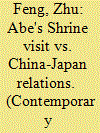

|
|
|
| 2 |
ID:
159297
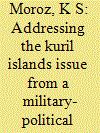

|
|
|
|
|
| Summary/Abstract |
This paper looks back at the origins of the dispute over the ownership of the Kuril Islands, its current state and military political prospects of its future development.
|
|
|
|
|
|
|
|
|
|
|
|
|
|
|
|
| 3 |
ID:
174263


|
|
|
|
|
| Summary/Abstract |
Through a two-level game analysis of Japan and Russia's territorial dispute, this article argues that while the elite circumstances have never been better to resolve this dispute, popular forces remain significantly divisive, such that the status quo over the Northern Territories will remain in place.
|
|
|
|
|
|
|
|
|
|
|
|
|
|
|
|
| 4 |
ID:
122075
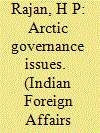

|
|
|
| 5 |
ID:
187352


|
|
|
|
|
| Summary/Abstract |
Arms races are linked in the public conscience to potential violence. Following gas discoveries in eastern Mediterranean, Greece and Turkey nearly came to blows in August 2020 and both states have enacted military expansion plans, further risking escalation. We present a novel approach to study the effect of military build-ups on dispute intensity, using monthly data on Turkish incursions into Greek-claimed airspace. Because airspace claims feature strongly in the dispute, these contestations represent an appropriate measure of the intensity with which Turkey pursues the conflict. Theoretically, we suggest that bilateral factors drive this intensity. We argue that increased Greek military capabilities deter incursions whereas increased Turkish military capabilities fuel them. Results from time-series models support the second expectation. Consequently, the study provides a novel methodological approach to studying interstate conflict intensity and shines new light on escalation dynamics in the Greek-Turkish dispute.
|
|
|
|
|
|
|
|
|
|
|
|
|
|
|
|
| 6 |
ID:
004259
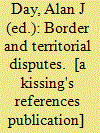

|
|
|
|
|
| Publication |
Essex, Longman, 1982.
|
| Description |
x,406p.
|
| Standard Number |
582902517
|
|
|
|
|
|
|
|
|
|
|
|
Copies: C:1/I:0,R:0,Q:0
Circulation
| Accession# | Call# | Current Location | Status | Policy | Location |
| 031325 | 341.42/DAY 031325 | Main | On Shelf | General | |
|
|
|
|
| 7 |
ID:
004843
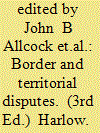

|
|
|
|
|
| Edition |
3rd Ed.
|
| Publication |
Harlow, Longman Grp., 1992.
|
| Description |
xii,630p.;maps
|
| Standard Number |
0-582-20931-5
|
|
|
|
|
|
|
|
|
|
|
|
Copies: C:1/I:0,R:0,Q:0
Circulation
| Accession# | Call# | Current Location | Status | Policy | Location |
| 035297 | R 341.42/ALL 035297 | Main | On Shelf | General | |
|
|
|
|
| 8 |
ID:
147017
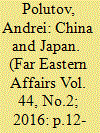

|
|
|
|
|
| Summary/Abstract |
This article examines the problem of the territorial dispute between China and Japan over the Senkaku/Diaoyudao Islands, along with the associated issues of developing oil and gas resources and the fishing industry in that region of the East China Sea, plus the military and political aspects of both sides' territorial claims.
|
|
|
|
|
|
|
|
|
|
|
|
|
|
|
|
| 9 |
ID:
098477
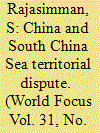

|
|
|
| 10 |
ID:
132627


|
|
|
|
|
| Publication |
2014.
|
| Summary/Abstract |
Within the last twenty years, China has become dependent on import of coal, oil and natural gas. Especially oil is now an economic and a security concern by the Chinese regime and key international stakeholders. Until 2035, China will account for one fourth of the global net growth in global gas consumption and more than half of the net growth in oil consumption. The future demand cannot be covered by China×s own conventional and unconventional sources. Pipelines from neighboring countries can cover more than half of the needed import of natural gas by 2030, but only 10 percent of the import demand of oil is secured so far. Even if China attempts to address its insufficient supply of oil by increased investments in overseas oil fields, there is still a large gap. Furthermore, the oil import will largely come from politically unstable countries and regions, and the bulk of the supplies must be shipped through the potentially insecure Hormuz and Malacca Straits. The ongoing territorial disputes with neighboring countries regarding areas with gas and oil reserves in contested waters bear evidence to regional conflict potentials, and China appears to engage more actively in energy diplomacy and regional cooperation.
|
|
|
|
|
|
|
|
|
|
|
|
|
|
|
|
| 11 |
ID:
118936
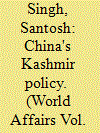

|
|
|
| 12 |
ID:
130638
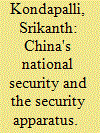

|
|
|
| 13 |
ID:
170582
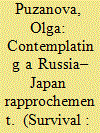

|
|
|
|
|
| Summary/Abstract |
Russia and Japan's narrow focus on their territorial dispute may inhibit its resolution as well as broader cooperation
|
|
|
|
|
|
|
|
|
|
|
|
|
|
|
|
| 14 |
ID:
134107
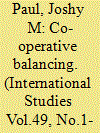

|
|
|
|
|
| Publication |
2014.
|
| Summary/Abstract |
The Asia-Pacific region is facing the threat of a number of potential military conflicts. Unresolved security challenges include the Sino-Japanese and Sino-Indian territorial disputes. The current peace and stability in the region has been achieved through various multilateral mechanisms and constant US involvement in the regional affairs. However, the declining US presence in Asia, the ineffectiveness of different multilateral institutions to establish a security order in the region and China's possible emergence as a great power in Asia may lead to the end of the status quo. In this context, it is pertinent that Asia should be free from both hegemony and power rivalry, and for that, 'co-operative balancing' is the best possible mechanism to achieve a long-term peace and stability. Co-operative balancing is a combination of power balancing and a co-operative security framework. It promotes the independent position of individual countries and strengthens the multilateral mechanisms. This essay concludes that India and Japan can balance against China while bilateral engagement among the three countries tends to reduce their distrust vis-à-vis China.
|
|
|
|
|
|
|
|
|
|
|
|
|
|
|
|
| 15 |
ID:
104425


|
|
|
| 16 |
ID:
146585
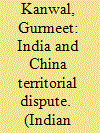

|
|
|
|
|
| Contents |
China's negotiating strategy on the territorial dispute is to stall resolution of the dispute till it is in
a much stronger position in terms of comprehensive national strength so that it can then dictate
term. The rapidly blossoming strategic partnership between China and Pakistan is also a major cause for concern. During any future conflict with either China or Pakistan - even though the probability is low, India will have to conted with a two- front situation as each is likely to collude military with the other - a situation for which the Indian armed forces are as yet unprepared. Hence, it is in India's interest to strive for the early resolutiion of the territorial dispute with China so that India has only one major military adversary to conted with.
|
|
|
|
|
|
|
|
|
|
|
|
|
|
|
|
| 17 |
ID:
130616
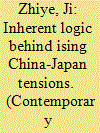

|
|
|
| 18 |
ID:
085721
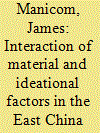

|
|
|
|
|
| Publication |
2008.
|
| Summary/Abstract |
This article seeks to explain the current phase of the East China Sea dispute between China and Japan. It argues that previous analyses privilege one aspect of the dispute over the other. Some stress the nationalist dimension of the dispute while others argue the primary motivations relate to the material wealth of the seabed combined with increased energy needs in China and Japan. By analysing the interaction between the nationalist (ideational) and resource (material) dimensions, it becomes clear why it has become increasingly difficult for policy elites in either state to seek compromise. This is because nationalist constituencies in China and Japan have extended their nationalist/ideational sentiment from the Senkaku/Diaoyu Islands to the entire East China Sea. Simultaneously, Beijing and Tokyo's interest in the material exploitation and security of the East China Sea has risen.
|
|
|
|
|
|
|
|
|
|
|
|
|
|
|
|
| 19 |
ID:
140021
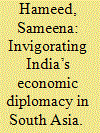

|
|
|
|
|
| Summary/Abstract |
For the past few years, India has made constant efforts to reach out to its neighbours by funding infrastructure projects to improve connectivity between India and its others neighbours in South Asia. It has already announced zero duty access for the least developed countries in the SAARC region, and has constantly pruned its sensitive list along with doses of economic aid. The present Government has made unambiguously clear that the prime focus of India’s economic diplomacy will be India’s immediate neighbourhood. The Prime Minster invited leaders of Afghanistan, Bangladesh, Bhutan, Maldives, Nepal, Pakistan, and Sri Lanka to his swearing ceremony, made Bhutan and Nepal his first international travel destinations, and resolved a seven-decade long territorial dispute with Bangladesh in December 2014. At the SAARC summit in November 2014 in Nepal, India backed three pacts to enhance connectivity and energy cooperation in the region.
|
|
|
|
|
|
|
|
|
|
|
|
|
|
|
|
| 20 |
ID:
128924


|
|
|